Transfer assembly
a technology of transceivers and parts, applied in the field of transceivers, can solve the problems of electromagnetic coupling, restricted patient's freedom of movement, and common source of infection of lead-through devices in the skin
- Summary
- Abstract
- Description
- Claims
- Application Information
AI Technical Summary
Benefits of technology
Problems solved by technology
Method used
Image
Examples
first embodiment
[0029]FIG. 1 shows a transfer assembly 10. The transfer assembly 10 comprises an intracorporeal implant 12 represented by a dashed line, and an extracorporeal supply means 14. The implant 12 is a blood pump for supporting a patient's heart activity, for example, and comprises a pumping means 16. The pumping means 16 usually operates continuously and has an energy requirement ranging from several watts to 20 watts. The implant 12 is a so-called fully implanted implant, i.e. the implant 12 has no physical connection with the outside of the body.
[0030]The electrical energy required for operating the blood pump 16 must therefore be transferred in a cordless manner. The transfer is performed via an implant 12 transfer coil 18 which is implanted immediately beneath the skin, and an extracorporeal transfer coil 20 of the extracorporeal supply means 14. In the transfer coil 20 of the supply means 14 small coils configured as receiving elements 22,23,24 are arranged which define inductive re...
second embodiment
[0035]FIG. 3 shows a transfer assembly 50, wherein the transmitter is defined by an optical transmitting element 52, and the receiver is defined by three optical receiving elements 54,55,56.
[0036]The transmitting element 52 is an infrared diode which is operated in a pulsed manner. The receiving elements 54,55,56 are photo diodes comprising infrared filters. In an evaluation module 30′ the signals coming from the optical receiving elements 54,55,56 are filtered by a band-pass filter whose filtering frequency is the pulse frequency at which the transmitting element 52 is chopped.
[0037]The evaluation of the infrared light intensity emitted by the transmitting element 52 and received by the receiving elements 54,55,56 enables the evaluation module 30′ to send a signal to the locating display 32, said signal furnishing information both on the direction of offset and on the amount of offset between the transfer coil 20 of the supply means 14 and the transfer coil 18 of the implant 12.
[00...
PUM
 Login to View More
Login to View More Abstract
Description
Claims
Application Information
 Login to View More
Login to View More - R&D
- Intellectual Property
- Life Sciences
- Materials
- Tech Scout
- Unparalleled Data Quality
- Higher Quality Content
- 60% Fewer Hallucinations
Browse by: Latest US Patents, China's latest patents, Technical Efficacy Thesaurus, Application Domain, Technology Topic, Popular Technical Reports.
© 2025 PatSnap. All rights reserved.Legal|Privacy policy|Modern Slavery Act Transparency Statement|Sitemap|About US| Contact US: help@patsnap.com



